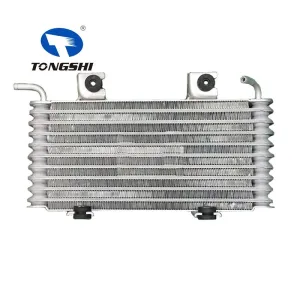Is it necessary to have an oil cooler?
The necessity of an oil cooler depends on the specific requirements of the engine and the operating conditions. In many cases, an oil cooler is a beneficial component that helps manage the temperature of the engine oil, providing several advantages. Here are factors to consider when determining whether an oil cooler is necessary:
Operating Temperature:
Engines generate heat during operation, and excessive heat can lead to increased wear and reduced efficiency. If the engine operates in high-temperature conditions or is subjected to heavy loads, an oil cooler can help maintain the oil at a suitable temperature.
Type of Engine:
High-performance engines, such as those in sports cars or heavy-duty vehicles, often generate more heat. In such cases, an oil cooler becomes more critical to ensure that the engine oil remains within the optimal temperature range.
Towing and Heavy Loads:
Vehicles involved in towing or carrying heavy loads put additional stress on the engine. An oil cooler is beneficial in these situations as it helps prevent the oil from overheating, ensuring proper lubrication and protection of engine components.
Climate Conditions:
In hot climates, engines are more prone to overheating. An oil cooler can be especially useful in mitigating the effects of high ambient temperatures on the engine oil, maintaining its viscosity and lubricating properties.

Performance and Efficiency:
Some engines, especially those designed for high performance, benefit from an oil cooler to enhance overall efficiency. Best oil Cooler helps maintain stable viscosity, ensuring better lubrication and contributing to improved engine performance.
Extended Engine Life:
Managing the temperature of the engine oil effectively through an oil cooler can contribute to the longevity of engine components. Cooler oil experiences less degradation and provides better protection against wear and tear.
Oil Viscosity Control:
Engine oil viscosity is crucial for proper lubrication. An oil cooler helps regulate oil viscosity by preventing it from becoming too thin at high temperatures. This is particularly important in ensuring consistent lubrication under varying operating conditions.
Oil Stability:
Cool oil is more stable and less prone to oxidation. An oil cooler helps maintain the stability of the engine oil, preventing the formation of sludge and deposits that can negatively impact engine performance.
While an oil cooler provides several benefits, there may be situations where it is not deemed necessary. For example, in smaller, low-performance engines operating in moderate climates and under typical driving conditions, the need for an oil cooler may be less critical.
In summary, the decision to install an oil cooler depends on the specific requirements of the engine, the operating conditions, and the intended use of the vehicle. In many cases, especially for high-performance engines or those operating in demanding conditions, an car oil cooler can be a valuable addition to ensure optimal engine performance and longevity.
328
0
0


Comments
All Comments (0)